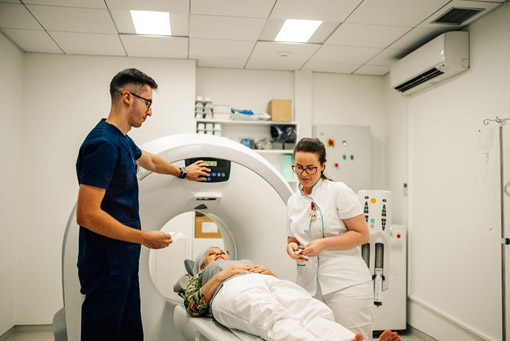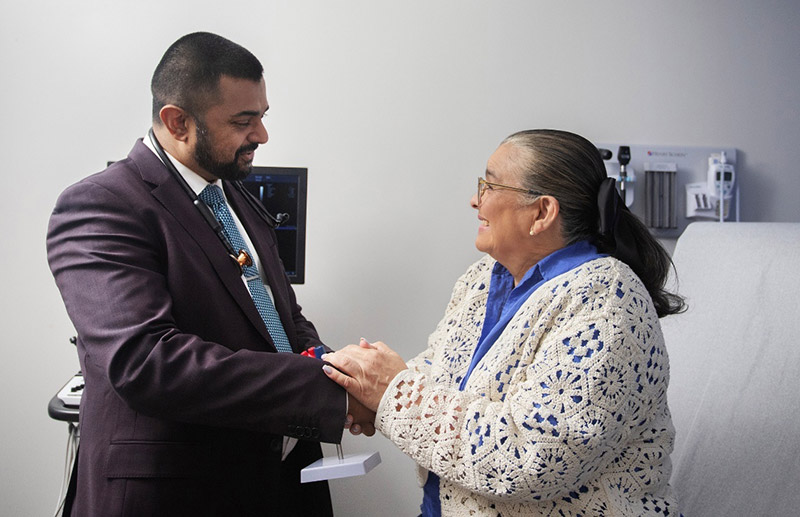
Stress Tests, CTs, and More: Which Heart Imaging Test Is Right for You?
When your provider says you need a heart imaging test, you may feel confused or worried. What kind of imaging test is it? Why do you need it? What will it show? These are all essential questions, and the good news is that a heart imaging test can give you and your doctor powerful information to protect your heart.
In this article, Dr. Jonathan Khodadadian, Medical Director of Radiology, provides an overview of the most common heart imaging tests and how these imaging tests can offer meaningful insights into your heart health. Additionally, we’ll share some helpful tips to help you prepare for a heart imaging test appointment. Whether you’re experiencing symptoms or being proactive, this article is designed to help you feel informed, empowered, and supported every step of the way.
Why Heart Imaging Tests Matter
Just as blood tests can uncover early signs of diabetes or high cholesterol, heart imaging tests provide a detailed look at the structure and function of your heart. Whether you’re having symptoms like chest pain or shortness of breath, or your doctor wants to check for underlying risk, a heart imaging test helps bring clarity.
Dr. Khodadadian provides an overview of the different heart imaging tests, why your provider is recommending one, and what you can expect during the appointment.
Stress Test
What it is: This test checks how your heart works when it’s working harder, usually during exercise.
Why it’s done:- To evaluate chest pain, shortness of breath, or fatigue.
- To look for narrowed or blocked arteries.
- To measure how your heart responds to activity.
What to expect: You’ll walk on a treadmill or get a medication that increases your heart rate. Your heart rate, blood pressure, and breathing are closely monitored during the test.
Echocardiogram (Echo)
What it is: An ultrasound of the heart that creates moving images using sound waves.
Why it’s done:- To check how well your heart is pumping.
- To examine your heart valves and chambers.
- To diagnose heart failure or heart muscle weakness.
What to expect: A small device called a transducer is placed on your chest to take images. It’s painless and usually takes 30 to 45 minutes.
CT Coronary Angiogram
What it is: A special CT scan that uses contrast dye to take clear images of the arteries in your heart.
Why it’s done:- To detect blockages or narrowing in your heart’s blood vessels.
- When stress test results are unclear or if you’re at intermediate risk for heart disease.
What to expect: You’ll lie on a table that slides into a CT scanner. You may receive a contrast dye through an IV. The scan is quick and noninvasive.
Cardiac MRI
What it is: A powerful imaging test that uses magnets (not radiation) to take detailed pictures of your heart.
Why it’s done:- To assess damage after a heart attack.
- To detect inflammation or rare heart conditions.
- To evaluate complex heart structure problems.
What to expect: You’ll lie in a tunnel-like MRI machine for about 30 to 60 minutes. It’s painless but may be noisy. A contrast agent may be used depending on the exam.
Cardiac PET CT
What it is: A Cardiac PET CT is a special heart scan that shows how well blood is flowing to your heart. It combines two types of imaging—PET and CT—to give your doctor a very clear picture of your heart’s health.
Why it’s done:- To check for blocked or narrowed arteries.
- To see how well blood is reaching your heart.
- To look for damage after a heart attack.
- If other tests didn’t give clear answers.
What to expect: You’ll get a small amount of a safe, low-dose tracer through an IV. Then you’ll lie on a table that slowly moves through a scanner. The test is painless and usually takes about 30 to 60 minutes. Your doctor may ask you not to eat or drink for a few hours before the test so the pictures come out clearly.

How Heart Imaging Tests Help Protect Your Health
Heart conditions often develop without warning, but heart imaging tests can reveal problems before symptoms appear. These imaging tests give your care team a clear view of how your heart is functioning, helping them make informed decisions tailored to your needs.
Dr. Khodadadian explains how heart imaging tests are key to shaping treatment plans and preventing severe conditions, so you get the right care at the right time:
- Confirm or Rule Out a Diagnosis: Imaging helps your doctor see what’s going on inside your heart, so you’re not left guessing.
- Guide Your Treatment Plan: Accurate test results can help your care team choose the safest and most effective path forward—whether medication, lifestyle changes, or further testing.
- Give You Peace of Mind: Even if your results are expected, imaging can provide reassurance and help you stay proactive about your heart health.
What to Do If Your Doctor Recommends a Heart Imaging Test
If your provider recommends a heart imaging test, it’s normal to have questions or concerns. However, it is critical to remember that these tests are tools to help your care team learn more about your heart and to help you stay healthy.
Here are some simple steps you can take to feel prepared and informed:
Don’t be afraid to speak up during your visit. Some helpful questions include:
- Why do I need this specific test?
- What are you looking for?
- What could the results tell us about my heart?
- Is this test safe for me?
Your doctor is there to support you!
Some heart tests require specific steps before your appointment. These may include:
- Fasting (not eating or drinking for a few hours beforehand).
- Avoiding caffeine or certain medications.
- Wearing comfortable clothes if you’ll be walking on a treadmill.
- Arriving early for check-in or paperwork.
Following your provider’s instructions helps ensure the results are accurate and the appointment goes smoothly.
After your test is complete:
- Ask when and how you’ll get the results.
- Schedule a follow-up appointment, if needed.
- Talk with your provider about what the results mean.
- Review any changes to your care plan or treatment.
Your provider will walk through the findings with you and explain what they mean for your health. Whether the results show that everything is normal or reveal something that needs treatment, you’ll have the information needed to make informed choices.

Taking the Next Step for Your Heart Health
Understanding the purpose behind heart imaging tests can remove fear and confusion from the process and help you feel more in control of your health. Whether it’s a stress test, echocardiogram, CT angiogram, or cardiac MRI, each imaging test plays a unique and essential role in giving your care team the information they need to protect your heart.
If your provider recommends a heart imaging test, know that it’s a proactive step—one that can prevent serious heart conditions before they start.
At Essen Health Care, we’re here to support you every step of the way, with state-of-the-art imaging services, compassionate care, and a commitment to keeping your heart strong.
Take charge of your heart health today.
Schedule your visit with a provider today:About Dr. Jonathan Khodadadian, MD

Dr. Jonathan Khodadadian, MD, is the Medical Director of Radiology at Essen Health Care. Before joining Essen, he served as Director of Molecular Imaging at ProHEALTH Care and practiced as a nuclear medicine physician with Zwanger-Pesiri Radiology. He earned his medical degree from the Sackler School of Medicine. At Essen Health Care, Dr. Khodadadian focuses on early detection, patient-centered care, and personalized imaging to support better health outcomes.